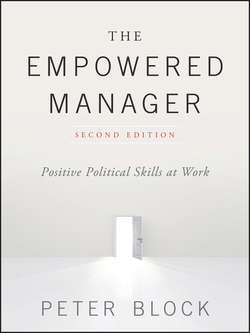Читать книгу The Empowered Manager - Block Peter - Страница 8
На сайте Литреса книга снята с продажи.
PART ONE
POLITICS IN THE WORKPLACE:REKINDLING THE ENTREPRENEURIAL SPIRIT
ОглавлениеThere is no more engaging and volatile aspect of work life than the dimension of organizational power for which the word politics is shorthand. In most places, people are not comfortable discussing politics openly. We know it is woven into the fabric of our work, but to get reliable information about it is next to impossible. In fact, the first rule of politics is that nobody will tell you the rules. When it is discussed, it is basically a negative process. If I told you that you were a very political person, you would take it either as an insult or at best as a mixed blessing.
The breeding ground for organizational politics as we know it is the patriarchal mind-set that pervades life in our workplaces. The essence of a patriarchal way of doing business is the choice for safety, predictability, and control. In our search for positive political acts we are forced to confront those forces in the organization that support patriarchy and make the internal entrepreneur a rare species.
This book offers an antidote to the patriarchal mentality that is bred in organizations. Patriarchy is a state of mind and exists regardless of the size of the organization or the level at which you work. The core of this mind-set is to believe the world and its people are fundamentally chaotic and self-centered and therefore have to be contained and directed. This wears the badge of strong and tough-minded leadership. It is also a belief that whenever there is a bump in the road, other people are the problem. Patriarchal beliefs are elusive because we always think they characterize someone else, never ourselves. Thus, efforts to improve our organization too often involve discussion of people outside the room we are in at the moment.
This attitude that it is not my fault is the essence of disempowerment. The alternative to this attitude is the entrepreneur. Most organizations were begun by someone who was willing to bet the farm, but as an organization grows and succeeds, it also creates the conditions for its own destruction. The need for bigness, structure, economy of scale, coordination, and fire-the-founder all work against the spirit of risk and responsibility that breathed life into the firm in the first place.
Reawakening the original spirit of creating something meaningful means we have to confront the issue of our own agency or independence. To pursue autonomy in the midst of a dependency-creating culture is an entrepreneurial act. This book is, in fact, written for those who think of themselves as being in the middle and who wish to create a culture and workplace of their own choosing.
Part One outlines how the patriarchal mind-set has come to drive most organizations and introduces ways of creating an environment and culture that support empowerment. It describes what drives us toward a bureaucratic, negatively political journey and outlines what the alternative, the more entrepreneurial and positive path, would be. Part Two discusses what we as individuals can do to reduce our feeling of futility and make our workplace an expression of our deepest values.
TWO
PERSONAL CHOICES THAT SHAPE THE WORK ENVIRONMENT
In being political we walk the tightrope between advocating our own position and yet not increasing resistance against us by our actions. The path we take is a mixture of two forces: (1) the individual choices we make in creating our environment and (2) the nature of the norms and culture of the organization in which we find ourselves imbedded.
As managers, in addition to delivering organizational outcomes, our fundamental purpose is to build a department and organization that we are proud of. Our unit in many ways becomes a living monument to our deepest beliefs in what is possible at work. We strive to create both a high-performing unit and one that treats its own members and its customers well. Each time we act as a living example of how we want the whole organization to operate, it is a positive political act.
Organizations have limited resources, limited budgets, limited people, and a limited number of actions they can attempt. We want at least our fair share of those resources. Therefore, the methods we use in reaching for those resources are at the heart of politics.
Конец ознакомительного фрагмента. Купить книгу
